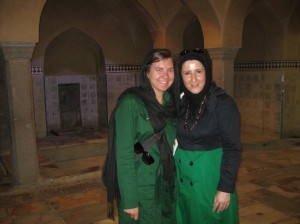A glimpse inside Iran: what do you want to know about my trip?

Since I returned from Iran, I have been poring over photos and videos and preparing to report back about the amazing experience I had, and to mobilize people to take action to pressure our government for a better Iran policy. I am excited to share what I learned while I had the privilege to be one of a small number of Americans who travel to Iran each year.
What would you like to know about my trip? How I was received? What Iranians think about Americans? Our government? Why Iranians put ketchup on their pizza? Ask anything in the comments and I’ll respond.
You can read the blog posts I wrote from Iran here and see photos here.



thanks for your good work on behalf of peace, justice, tolerance and cooperation. My wife and I were with our friend Yuval Ron
http://www.yuvalronmusic.com
in Morocco at World Festival of Sacred Music
and so appreciated our opportunity to dip into the mysterious sands and waters of Morocco.
Dancing and chanting with Sufis to that drumbeat of the soul reminded me of how important it is to tune to that channel and resist the drumbeat of war.
Let’s prevent another debacle in Afghanistan…Iran….wherever.
Peace and blessings,
Dean
Thank you for sharing your journey with us. It is so exciting to get beyond national boundaries and meet others on the common ground of simply being human. I have a question for you about the nuclear issue: what do average Iranians think about their own country’s nuclear power research and how this plays into the world community’s perception of Iran as a nation? Is this an issue in the upcoming election? Do they believe it is worth pursuing given the opportunity for further warmongering rhetoric and international alienation?
This is an important question, and I don’t think we hear the Iranian perspective on this issue very often. Most people I met feel there is a double standard at play in the international community’s, and in particular the United States’, attitude toward Iran’s nuclear program. One student at Tehran University asked me why the US is so worried about their nuclear program when Iran has never attacked the US, and other countries have similar nuclear programs.
You may have noticed that Mir Hossein Mousavi, the leading reforming candidate in the Iranian election, also said Iran would continue uranium enrichment. Every Iranian I met wants better relations with the United States (and presumably other countries), but not at the cost of their national pride. They want the US to treat Iran with respect. Many people I met resent that the United States is constantly telling Iran what to do. Iran is a nationalistic country–one cab driver I met said his brother was a political prisoner murdered by the Iranian government in the 1980s, and he hates the current regime, but he would pick up a gun to defend it.
These dynamics are important for US politicians to keep in mind when determining how to interact with Iran. Iranians are cautiously optimistic, but they don’t trust the US after years of meddling in Iran’s affairs (the coup in 1953, the support of Saddam Hussein during the Iran-Iraq War) and want to see concrete action before they will believe US policy is truly changing. Congress needs to start by dropping its threats of sanctions–it could rally people around the government, and makes Iranians think the attempts at diplomacy are disingenuous.
You were wearing a scarf as were the other women, is this a law or a preference. If it is a law based on their religion, did any of the women express a desire not to wear them and maybe even afraid of more stringent rules such a having to wear a burka. ?
Wearing the hijab is required by law in Iran. As our plane was landing, there was an announcement on behalf of the government that we needed to cover our hair before getting off the plane. Unfortunately, I didn’t have a lot of conversations about whether women want to wear it, but my understanding is that the feeling is mixed–some would choose to continue to wear it as a religious observance, and some would rather not wear it at all. It’s clear that the dress code is a lot less strict though than it was near the beginning of the revolution. Our leader Leila, who grew up in Iran and now lives in the United States, said that during her childhood you could get arrested for showing too much hair or not wearing dark colors. Now you will see the whole gamut–conservative women in black chadors (the long black covering that leaves only the face exposed) to people wearing relatively tight-fitting manteaus and colorful headscarves. When I went to the mall, I saw young women with lots of makeup on, and large puffs of dyed hair showing under their headscarves, which were far back on their heads in a less conservative style. I did not sense that there was any fear that the dress code would become more strict in the near future.
Why do Iranians put ketchup on their pizza?
I’m actually not sure I have a definitive answer to that one. But usually it doesn’t have tomato sauce, so I guess that’s the replacement. I really can’t explain the occasional use of mayonnaise though.
Yes
We Iranians to tomato sauce pizza, we will. But we are more traditional dishes we love. Plvhay various kinds of soup and
Guess it’ll tell you. We Iranians with any government that wants the right to nuclear deal will take us. Even if our government wants it. All of us Iranians Hazrym get killed for their homeland. This is a bad thing. This Defense Iran